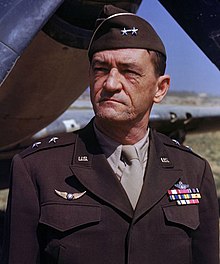Claire Lee Chennault | |
|---|---|
 | |
| Nickname(s) | "Old Leatherface" |
| Born | September 6, 1893[1] Commerce, Texas, U.S. |
| Died | July 27, 1958 (aged 64) New Orleans, Louisiana, U.S. |
| Buried | |
| Allegiance | |
| Service | (1945–1958) |
| Years of service | 1917–1945 |
| Rank | Lieutenant General (US) General (ROC) |
| Commands | |
| Battles / wars | |
| Awards | |
| Spouse(s) |
|
Claire Lee Chennault (September 6, 1893 – July 27, 1958)[2] was an American military aviator best known for his leadership of the "Flying Tigers" and the Chinese Nationalist Air Force in World War II.
Chennault was a fierce advocate of "pursuit" or fighter-interceptor aircraft during the 1930s when the United States Army Air Corps was focused primarily on high-altitude bombardment. Chennault retired from the United States Army in 1937, and went to work as an aviation adviser and trainer in China.
Starting in early 1941, Chennault commanded the 1st American Volunteer Group (nicknamed Flying Tigers). He headed both the volunteer group and the uniformed U.S. Army Air Forces units that replaced it in 1942. He feuded constantly with General Joseph Stilwell, the U.S. Army commander in China, and helped China's Generalissimo Chiang Kai-shek to convince President Roosevelt to remove Stilwell in 1944. The China-Burma-India theater was strategically essential in order to fix many vital elements of the Imperial Japanese Army on the Chinese mainland to limit their use against Allied forces advancing towards Japan in the two Pacific campaigns.